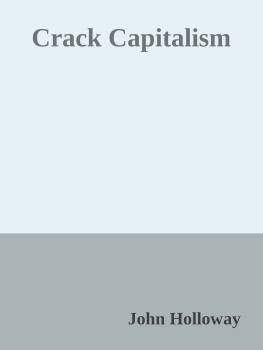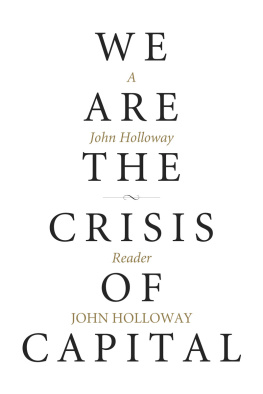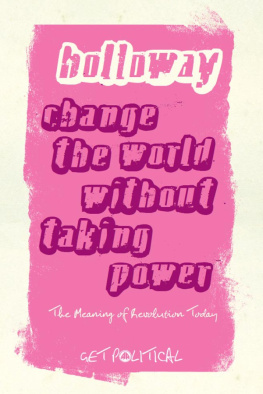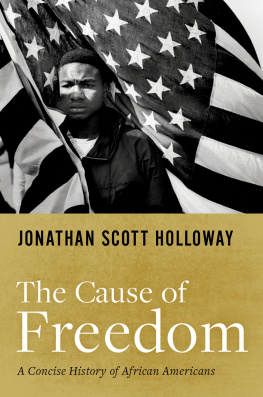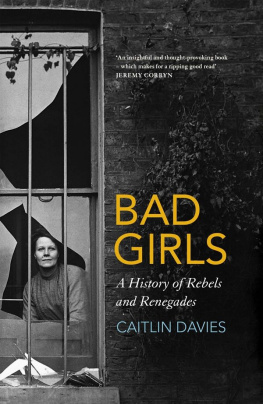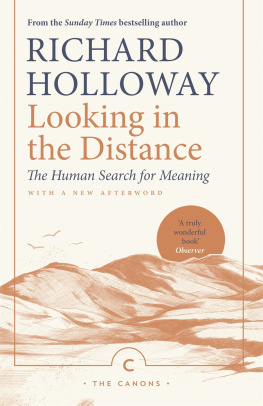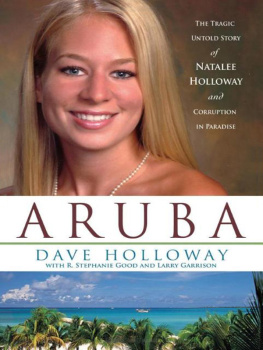John Holloway - Crack Capitalism
Here you can read online John Holloway - Crack Capitalism full text of the book (entire story) in english for free. Download pdf and epub, get meaning, cover and reviews about this ebook. year: 2010, genre: Politics. Description of the work, (preface) as well as reviews are available. Best literature library LitArk.com created for fans of good reading and offers a wide selection of genres:
Romance novel
Science fiction
Adventure
Detective
Science
History
Home and family
Prose
Art
Politics
Computer
Non-fiction
Religion
Business
Children
Humor
Choose a favorite category and find really read worthwhile books. Enjoy immersion in the world of imagination, feel the emotions of the characters or learn something new for yourself, make an fascinating discovery.
- Book:Crack Capitalism
- Author:
- Genre:
- Year:2010
- Rating:3 / 5
- Favourites:Add to favourites
- Your mark:
- 60
- 1
- 2
- 3
- 4
- 5
Crack Capitalism: summary, description and annotation
We offer to read an annotation, description, summary or preface (depends on what the author of the book "Crack Capitalism" wrote himself). If you haven't found the necessary information about the book — write in the comments, we will try to find it.
Crack Capitalism — read online for free the complete book (whole text) full work
Below is the text of the book, divided by pages. System saving the place of the last page read, allows you to conveniently read the book "Crack Capitalism" online for free, without having to search again every time where you left off. Put a bookmark, and you can go to the page where you finished reading at any time.
Font size:
Interval:
Bookmark:
CONTENTS
CRACK CAPITALISM
John Holloway
2010
Part I
Break
1. Break. We want to break. We want to create a different world. Now. Nothing more common, nothing more obvious. Nothing more simple. Nothing more difficult.
Break. We want to break. We want to break the world as it is. A world of injustice, of war, of violence, of discrimination, of Gaza and Guantnamo. A world of billionaires and a billion people who live and die in hunger. A world in which humanity is annihilating itself, massacring non-human forms of life, destroying the conditions of its own existence. A world ruled by money, ruled by capital. A world of frustration, of wasted potential.
We want to create a different world. We protest, of course we protest. We protest against the war, we protest against the growing use of torture in the world, we protest against the turning of all life into a commodity to be bought and sold, we protest against the inhuman treatment of migrants, we protest against the destruction of the world in the interests of profit.
We protest and we do more. We do and we must. If we only protest, we allow the powerful to set the agenda. If all we do is oppose what they are trying to do, then we simply follow in their footsteps. Breaking means that we do more than that, that we seize the initiative, that we set the agenda. We negate, but out of our negation grows a creation, an other-doing, an activity that is not determined by money, an activity that is not shaped by the rules of power. Often the alternative doing grows out of necessity: the functioning of the capitalist market does not allow us to survive and we need to find other ways to live, forms of solidarity and cooperation. Often too it comes from choice: we refuse to submit our lives to the rule of money, we dedicate ourselves to what we consider necessary or desirable. Either way, we live the world we want to create.
Now. There is an urgency in all this. Enough! Ya basta! We have had enough of living in, and creating, a world of exploitation, violence and starvation. And now there is a new urgency, the urgency of time itself. It has become clear that we humans are destroying the natural conditions of our own existence, and it seems unlikely that a society in which the determining force is the pursuit of profit can reverse this trend. The temporal dimensions of radical and revolutionary thought have changed. We place a skull on our desks, like the monks of old, not to glorify death, but to focus on the impending danger and intensify the struggle for life. It no longer makes sense to speak of patience as a revolutionary virtue or to talk of the future revolution. What future? We need revolution now, here and now. So absurd, so necessary. So obvious.
Nothing more common, nothing more obvious. There is nothing special about being an anti-capitalist revolutionary. This is the story of many, many people, of millions, perhaps billions.
It is the story of the composer in London who expresses his anger and his dream of a better society through the music he composes. It is the story of the gardener in Cholula who creates a garden to struggle against the destruction of nature. Of the car worker in Birmingham who goes in the evenings to his garden allotment so that he has some activity that has meaning and pleasure for him. Of the indigenous peasants in Oventic, Chiapas, who create an autonomous space of self-government and defend it every day against the paramilitaries who harass them. Of the university professor in Athens who creates a seminar outside the university framework for the promotion of critical thought. Of the book publisher in Barcelona who centres his activity on publishing books against capitalism. Of the friends in Porto Alegre who form a choir, just because they enjoy singing. Of the teachers in Puebla who confront police oppression to fight for a different type of school, a different type of education. Of the theatre director in Vienna who decides she will use her skills to open a different world to those who see her plays. Of the call centre worker in Sydney who fills all his vacant moments thinking of how to fight for a better society. Of the people of Cochabamba who come together and fight a battle against the government and the army so that water should not be privatised but subject to their own control. Of the nurse in Seoul who does everything possible to help her patients. Of the workers in Neuqun who occupy the factory and make it theirs. Of the student in New York who decides that university is a time for questioning the world. Of the community worker in Dalkeith who looks for cracks in the framework of rules that constrain him so that he can open another world. Of the young man in Mexico City, who, incensed by the brutality of capitalism, goes to the jungle to organise armed struggle to change the world. Of the retired teacher in Berlin who devotes her life to the struggle against capitalist globalisation. Of the government worker in Nairobi who gives all her free time to the struggle against AIDS. Of the university teacher in Leeds who uses the space that still exists in some universities to set up a course on activism and social change. Of the old man living in an ugly block of flats on the outskirts of Beirut who cultivates plants on his windowsill as a revolt against the concrete that surrounds him. Of the young woman in Ljubljana, the young man in Florence, who, like so many others throughout the world, throw their lives into inventing new forms of struggle for a better world. Of the peasant in Huejotzingo who refuses to allow his small orchard to be annexed to a massive park of unsold cars. Of the group of homeless friends in Rome who occupy a vacant house and refuse to pay rent. Of the enthusiast in Buenos Aires who devotes all his great energies to opening new perspectives for a different world. Of the girl in Tokyo who says she will not go to work today and goes to sit in the park with her book, this book or some other. Of the young man in France who devotes himself to building dry toilets as a contribution to radically altering the relation between humans and nature. Of the telephone engineer in Jalapa who leaves his job to spend more time with his children. Of the woman in Edinburgh who, in everything she does, expresses her rage through the creation of a world of love and mutual support.
This is the story of ordinary people, some of whom I know, some of whom I have heard of, some of whom I have invented. Ordinary people: rebels, revolutionaries perhaps. We are quite ordinary women and men, children and old people, that is, rebels, non-conformists, misfits, dreamers, say the Zapatistas in their most profound and difficult challenge of all.
The ordinary people in our list are very different from one another. It may seem strange to place the car worker who goes to his allotment in the evening next to the young man who goes to the jungle to devote his life to organising armed struggle against capitalism. And yet there is a continuity. What both have in common is that they share in a movement of refusal-and-other-creation: they are rebels, not victims; subjects, not objects. In the case of the car worker, it is individual and just evenings and weekends; in the case of the young man in the jungle, it is a very perilous commitment to a life of rebellion. Very different and yet with a line of affinity that it would be very wrong to overlook.
Nothing more simple. The sixteenth-century French theorist La Botie expressed the simplicity of revolution with great clarity in his Discourse on Voluntary Servitude (1546/2002: 139-40):
You sow your crops in order that he [the lord] may ravage them, you install and furnish your homes to give him goods to pillage; you rear your daughters that he may gratify his lust; you bring up your children in order that he may confer upon them the greatest privilege he knowsto be led into his battles, to be delivered to butchery, to be made the servants of his greed and the instruments of his vengeance; you yield your bodies unto hard labour in order that he may indulge in his delights and wallow in his filthy pleasures; you weaken yourselves in order to make him the stronger and the mightier to hold you in check. From all these indignities, such as the very beasts of the field would not endure, you can deliver yourselves if you try, not by taking action, but merely by willing to be free. Resolve to serve no more, and you are at once freed. I do not ask that you place hands upon the tyrant to topple him over, but simply that you support him no longer; then you will behold him, like a great Colossus whose pedestal has been pulled away, fall of his own weight and break in pieces.Next pageFont size:
Interval:
Bookmark:
Similar books «Crack Capitalism»
Look at similar books to Crack Capitalism. We have selected literature similar in name and meaning in the hope of providing readers with more options to find new, interesting, not yet read works.
Discussion, reviews of the book Crack Capitalism and just readers' own opinions. Leave your comments, write what you think about the work, its meaning or the main characters. Specify what exactly you liked and what you didn't like, and why you think so.

